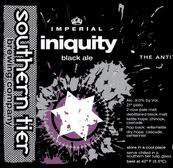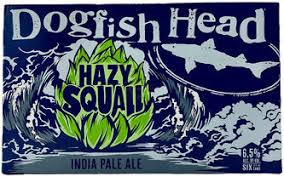 Well-integrated velvety smooth dark ale maintains mocha-driven piney fruited complexity. Maple molasses-sapped caramel malts infiltrate chocolate-covered raisin, black cherry, spiced rum and sugar plum illusions. A hint of bourbon or burgundy fills out recessive coffee easement.
Well-integrated velvety smooth dark ale maintains mocha-driven piney fruited complexity. Maple molasses-sapped caramel malts infiltrate chocolate-covered raisin, black cherry, spiced rum and sugar plum illusions. A hint of bourbon or burgundy fills out recessive coffee easement. OTTER CREEK WORLD TOUR OTTER MON JAMAICAN-STYLE STOUT
 Slick ink black milk stout brings stove-burnt coffee souring to light chocolate-caramel roast. Dark spices, vanilla extract, and anise fill out oats-charred backdrop, but peppery hop astringency and harsh nuttiness overwhelm sugar-caned mocha aspect.
Slick ink black milk stout brings stove-burnt coffee souring to light chocolate-caramel roast. Dark spices, vanilla extract, and anise fill out oats-charred backdrop, but peppery hop astringency and harsh nuttiness overwhelm sugar-caned mocha aspect. SARANAC IRISH RED ALE
Aromatic caramel-toffee sweetness disrupted by faded floral hop astringency that delicately fizzles out. Abbreviated toasted graining, muted mocha wisp, and blah orange-apple-peach tang barely inform ill-defined metallic finish.

OTTER CREEK WORLD TOUR SPHINX MULTIGRAIN ALE
 Toot-sweet Egyptain-styled multi-grained pale ale ‘brewed with honey and chamomile’ finds both advertised adjuncts hitting their mark firmly. Anticipatory honey-dripped affluence slowly picks up tea-like subsidy overrun by pasty marzipan-butterscotch creaminess and warm almondine illusion. Astringent hop coarseness and minor diacetyl buttering cut into mild ginger-snapped cinnamon-nutmeg interlude.
Toot-sweet Egyptain-styled multi-grained pale ale ‘brewed with honey and chamomile’ finds both advertised adjuncts hitting their mark firmly. Anticipatory honey-dripped affluence slowly picks up tea-like subsidy overrun by pasty marzipan-butterscotch creaminess and warm almondine illusion. Astringent hop coarseness and minor diacetyl buttering cut into mild ginger-snapped cinnamon-nutmeg interlude. DEFIANT BELGIAN-STYLE TRIPEL ALE
Well-defined chartreuse-hazed witbier not far removed from Ommegang’s impressive Abbey ales matches herbaceous farmhouse nature to yellow-fruited souring, dark-spiced sweetness, and earthen mineral graining. Sour lemony banana blitz receives candi-sugared apricot glaze and clove-spearmint-green tea tingle reinforced by mild white-peppered hop bittering.


THE WEDGE
JOHN HARVARD’S BREW HOUSE – LAKE GROVE
 LONG ISLAND, NEW YORK
Perched between Black Forest Brew Haus (a half-hour east) and Southampton Publick House (an hour west) in the mall-filled village of Lake Grove, JOHN HARVARD’S BREW HOUSE is an affiliate Northeast brewpub with same-named locations in Connecticut and Massachusetts (plus Providence, Rhode Island’s Union Station Brewery). Originally opened 1997 (and closed around 2020), this spacious freestanding Smith Haven Mall bar-restaurant (with flashy maroon awnings) greets customers at its bright yellow-painted middle entrance.
Visited August ’09, the commodious interior featured formal right side wooden square bar (festooned by hanging ceramic mugs and multi-TV’s) serving surrounding pub area and large left dining spaces with house beers from large glass-encased center-staged brew tanks. Menu included fine salads, gourmet sandwiches, and Americana fare to go with Dave De Turris’ stylistically distinct beers and ales.
Lighter libations included astringent straw wheat-fronted, maize-dried, lemon-spiced Long Island Light, soft grapefruit-tangerine-lingered honey-malted woody-hopped dry-bodied John Harvard’s Pale Ale,and mild lemon-candied honey-glazed banana-cloved Hugh Hefe.
Buttery vanilla-honeyed, candi-sugared, cream-corned, cinnamon-nutmeg-spiced Belgian Tripel and soft black cherry-ripened, cedar-charred, beechwood-smoked Flanders Flemish Stout (with ascending stove-burnt coffee finish) were Euro-styled delights.
Dry-bodied apple-orange-grape-soured celery-thin Red In The Face (Red) Ale merely sufficed but toffee-malted plum-soured cherry-pureed banana-breaded grape-nutty apple-skinned Mad Tom’s Old Ale proved interesting.
Best bet: Belgian-styled witbier, Friggin’ Swheat, a busy medium-bodied delight featuring toned-down Italian plum, boysenberry, and blackberry fruiting usurped by dry cider-soured cherry-banana-confluence rising above recessive lime-y brimstone dusting.
www.johnharvards.com
LONG ISLAND, NEW YORK
Perched between Black Forest Brew Haus (a half-hour east) and Southampton Publick House (an hour west) in the mall-filled village of Lake Grove, JOHN HARVARD’S BREW HOUSE is an affiliate Northeast brewpub with same-named locations in Connecticut and Massachusetts (plus Providence, Rhode Island’s Union Station Brewery). Originally opened 1997 (and closed around 2020), this spacious freestanding Smith Haven Mall bar-restaurant (with flashy maroon awnings) greets customers at its bright yellow-painted middle entrance.
Visited August ’09, the commodious interior featured formal right side wooden square bar (festooned by hanging ceramic mugs and multi-TV’s) serving surrounding pub area and large left dining spaces with house beers from large glass-encased center-staged brew tanks. Menu included fine salads, gourmet sandwiches, and Americana fare to go with Dave De Turris’ stylistically distinct beers and ales.
Lighter libations included astringent straw wheat-fronted, maize-dried, lemon-spiced Long Island Light, soft grapefruit-tangerine-lingered honey-malted woody-hopped dry-bodied John Harvard’s Pale Ale,and mild lemon-candied honey-glazed banana-cloved Hugh Hefe.
Buttery vanilla-honeyed, candi-sugared, cream-corned, cinnamon-nutmeg-spiced Belgian Tripel and soft black cherry-ripened, cedar-charred, beechwood-smoked Flanders Flemish Stout (with ascending stove-burnt coffee finish) were Euro-styled delights.
Dry-bodied apple-orange-grape-soured celery-thin Red In The Face (Red) Ale merely sufficed but toffee-malted plum-soured cherry-pureed banana-breaded grape-nutty apple-skinned Mad Tom’s Old Ale proved interesting.
Best bet: Belgian-styled witbier, Friggin’ Swheat, a busy medium-bodied delight featuring toned-down Italian plum, boysenberry, and blackberry fruiting usurped by dry cider-soured cherry-banana-confluence rising above recessive lime-y brimstone dusting.
www.johnharvards.com BANKS CARIBBEAN LAGER
 Simple pale-bodied session beer that’ll satisfy poorer American blue collar tastes. Sour corn-oiled turn-off picks up dry phenol hop bittering fortifying fragile barley-roasted wheat-cracked spine to minimal soapy finish. Oily diacetyl mouthfeel, putrid Scotch malting, green apple souring, and cooked vegetable tinge beat down satisfactory rice adjunct.
Simple pale-bodied session beer that’ll satisfy poorer American blue collar tastes. Sour corn-oiled turn-off picks up dry phenol hop bittering fortifying fragile barley-roasted wheat-cracked spine to minimal soapy finish. Oily diacetyl mouthfeel, putrid Scotch malting, green apple souring, and cooked vegetable tinge beat down satisfactory rice adjunct. 21ST AMENDMENT BREW FREE OR DIE I.P.A.
Famous San Francisco brewpub gets Cold Spring, Minnesota brewery to can its finest offering. Busy piney spruce swagger informs up-front pineapple-nectar sweetness, subsidiary apricot-peach-tangerine tang and tertiary cantaloupe-watermelon juiciness to creamy malt chocolate-y backdrop. Bitter grassy-hopped lemony orange-peeled grapefruit influence penetrates sly currant sway. Reserved hop profile may preclude hard-headed hop-heads, but the loss is truly theirs. Well integrated fruited malting and minor matchstick head nuance not far removed from Samuel Adams Boston Lager.

KELSO PILSNER
 Dank-grained medium-bodied Czech pils with lemony hop fizz and floral-spiced Orange Blossom honey drift falls way short. Vacant crystal malt sweetness and inferior vegetal spill (asparagus-maize-carrot) sink it further into stylistic oblivion.
Dank-grained medium-bodied Czech pils with lemony hop fizz and floral-spiced Orange Blossom honey drift falls way short. Vacant crystal malt sweetness and inferior vegetal spill (asparagus-maize-carrot) sink it further into stylistic oblivion. SAMUEL ADAMS LONGSHOT DOUBLE I.P.A.
 Worthy amber-hazed full body brings resinous piney-hopped grapefruit-orange rind bittering to sticky caramel malt sweetness swaying huge marzipan-almond imprint. Rum cake, pine nut, dark spice and floral illusions fill out rounded dry-fruited finish. A hop-head lover’s delight.
Worthy amber-hazed full body brings resinous piney-hopped grapefruit-orange rind bittering to sticky caramel malt sweetness swaying huge marzipan-almond imprint. Rum cake, pine nut, dark spice and floral illusions fill out rounded dry-fruited finish. A hop-head lover’s delight. DOGFISH HEAD SQUALL I.P.A.
Resinous piney grapefruit opening counters resolute mocha malt sweetness, cinnamon-sugared apple-pear confluence, and peachy pineapple-melon tang. Peppery hop-spiced tingle allows floral rose pedal, jasmine, and daisy illusions to blossom alongside almond-pasted clove-allspice nuances.
